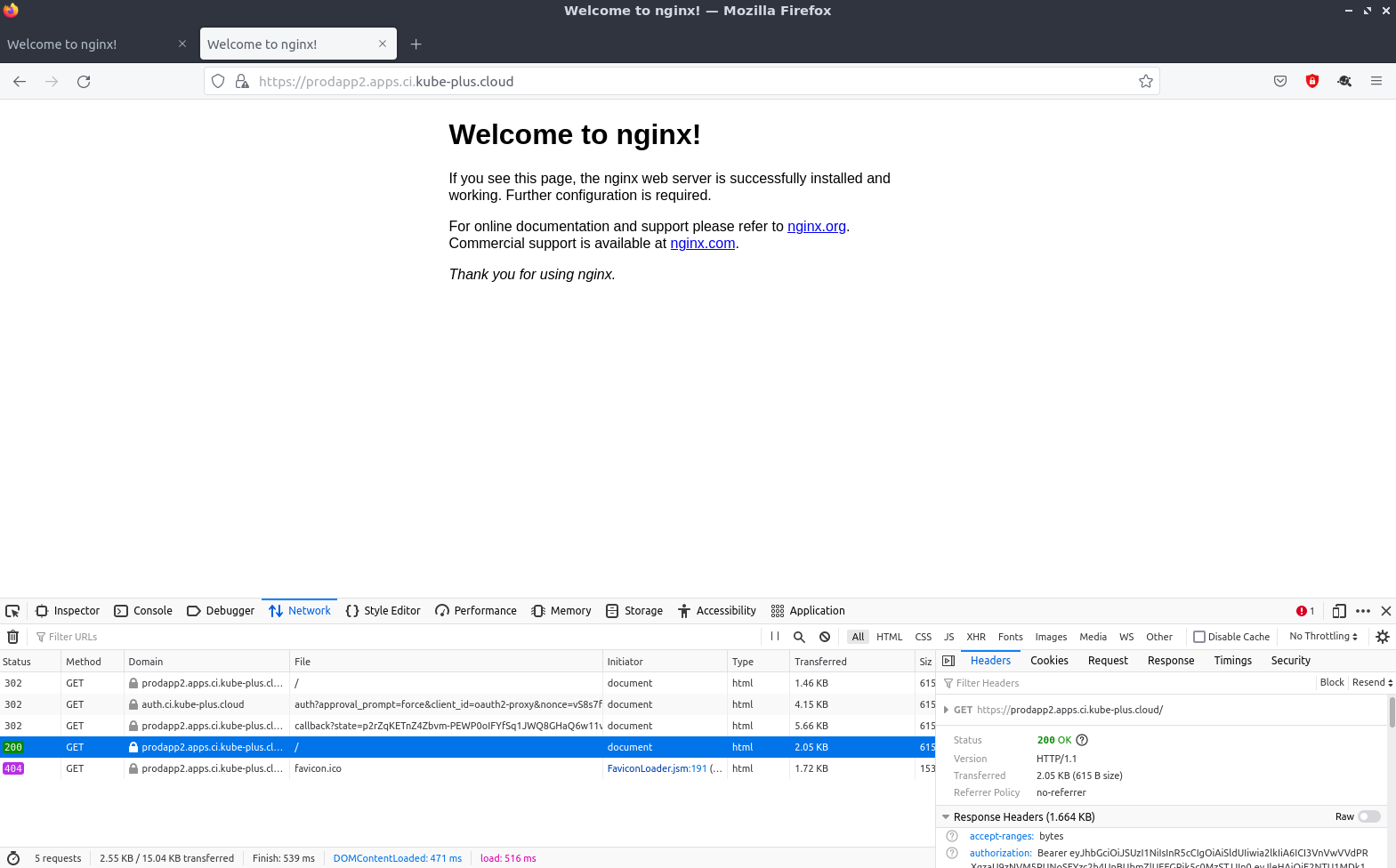# Setup Single Sign-On sidecar
A solution to protect your deployed app and without modifying your codebase could be to add a sidecar which supports the authentication flow to an OIDC provider. In the example below we demonstrate how this can be achived.
# Configurations steps
On Keycloak we need to use a new or an existing OAuth client with some configurations.
A kubernetes deplyoment consisting of a "nginx" and an additional "oauth2-proxy" container.
As OIDC provider keycloak will be used.
Created and used client on keycloak: oauth2-proxy
The application named "prodapp" will be acessible with the url: https://prodapp.ci.kube-plus.cloud
Expected behaviour: On accessing the URL and if the user is not already logged in from another/valid session (SSO) then the authentication process will take place.
Project "oauth2-proxy": https://github.com/oauth2-proxy/oauth2-proxy (opens new window)
Configuration of the oauth2-proxy: Reference oauth2-proxy options (opens new window)
# The client setup on keycloak
For this how-to example we set up a dedicated OIDC client "oauth2-proxy" in the kube-plus realm. It is a minimalist configuration and only to show what is neccessary to setup the SSO experience. In real production environments more specific settings are needed to distinguish who can access a resource.
# Definitions oauth2-proxy client
# Client: redirect URI.
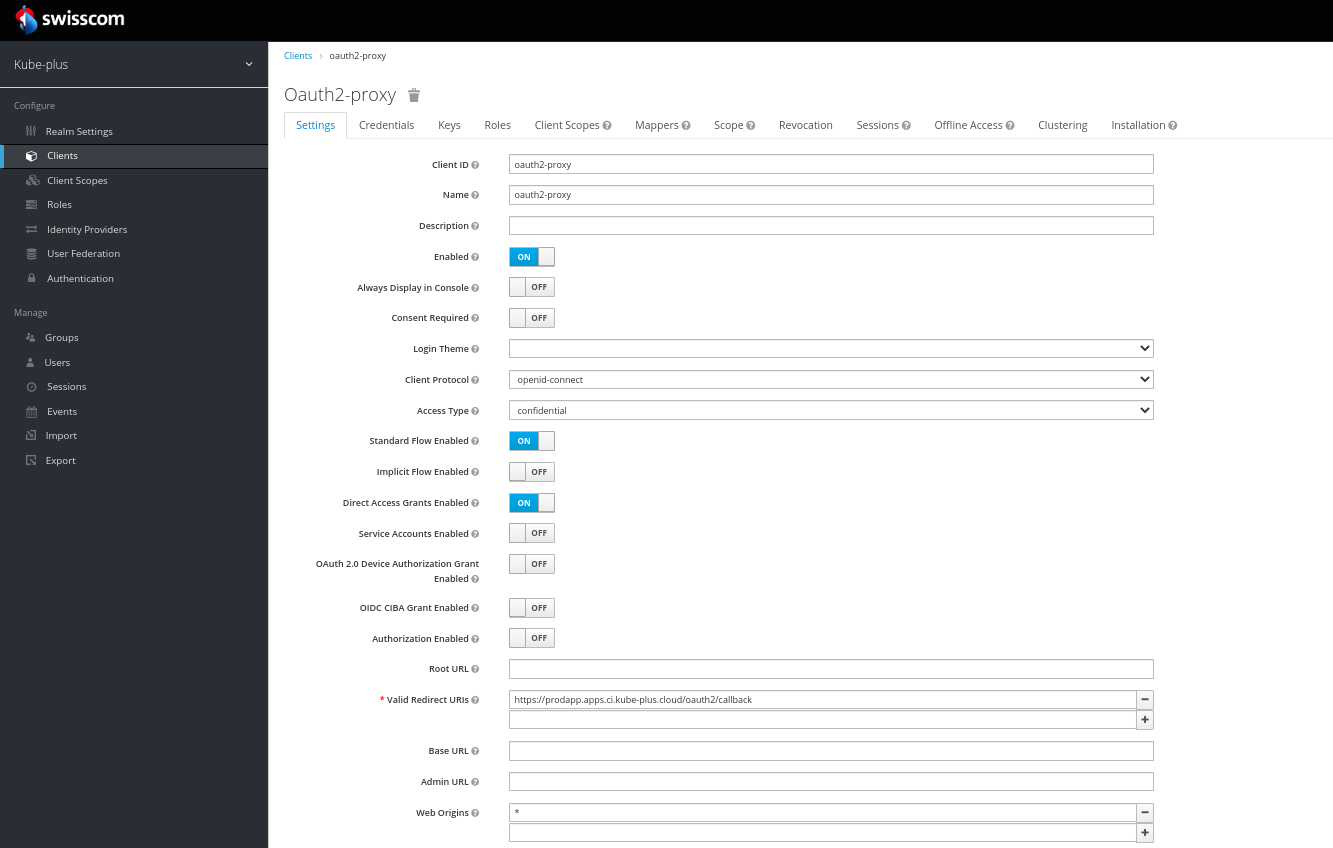
# Client:mappers: overview Group and Audience

# Client:mappers: Token Claim Name groups and Type Group Membership
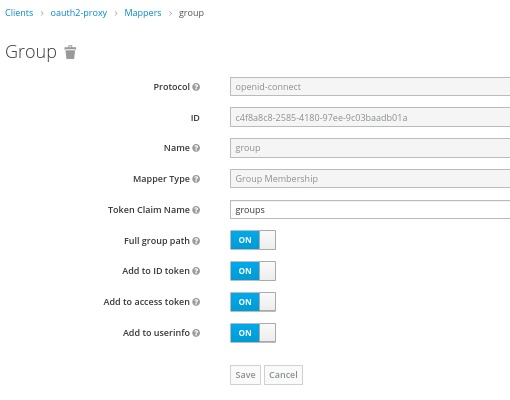
# Client:mappers: Type Audience and oauth-proxy
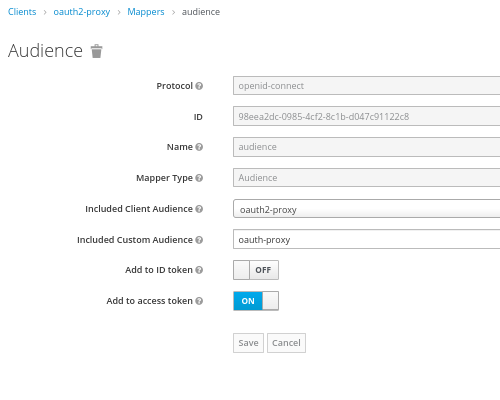
# Client:client scopes:
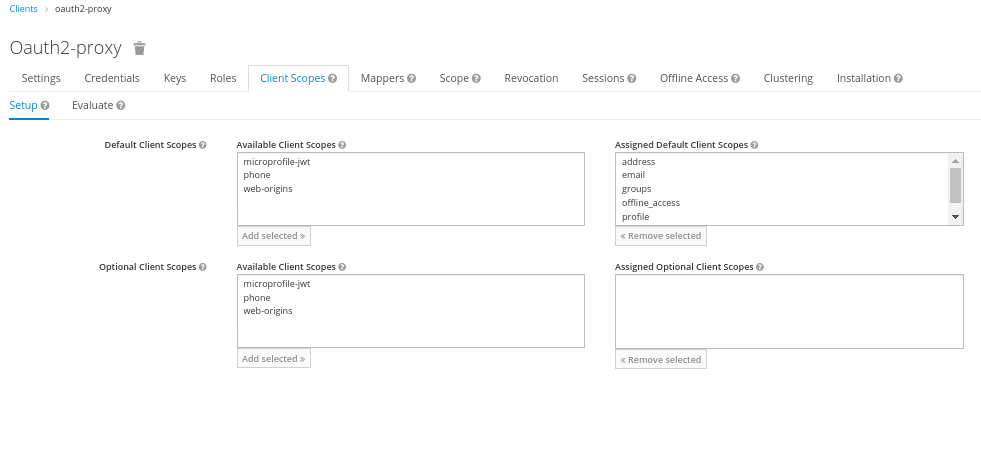
# The kubernetes deployment
Below the content of the used manifest within the file "prodapp-oauth2.yaml".
With this we deploy the nginx and oauth2-proxy.
The oauth2-proxy will get specific configurations with the 'args' and secrets will be consumed from "ENV".
#namespace
---
apiVersion: v1
kind: Namespace
metadata:
labels:
kubernetes.io/metadata.name: authapps
name: authapps
#service. In this case we define the oauth2-proxy as request handler. See argument "upstream" on oauth2-proxy deployment further below.
---
apiVersion: v1
kind: Service
metadata:
labels:
app.kubernetes.io/name: prodapp
name: prodapp-oauth2-proxy
namespace: authapps
spec:
ports:
- name: auth
port: 4180
protocol: TCP
targetPort: 4180
selector:
app.kubernetes.io/name: prodapp
type: ClusterIP
#secrets for the serviceaccount oauth2-proxy and some needed tls certificates
---
apiVersion: v1
kind: Secret
metadata:
name: oauth2-proxy
namespace: authapps
stringData:
OAUTH2_PROXY_CLIENT_ID: oauth2-proxy #new keycloak client used for the How-To
OAUTH2_PROXY_CLIENT_SECRET: <<redacted>> #secret of the keycloak client
OAUTH2_PROXY_COOKIE_SECRET: 1KilodeD4qFD_ym1MwikUQo3EWkbD58ltQ3RurhN0N0= #random. Genereate one e.g. with bash: dd if=/dev/urandom bs=32 count=1 2>/dev/null | base64 | tr -d -- '\n' | tr -- '+/' '-_'; echo
---
apiVersion: v1
kind: Secret
metadata:
annotations:
replicator.v1.mittwald.de/replicate-from: cert-manager/ca-bundle-kube-plus
replicator.v1.mittwald.de/replicated-from-version: "0"
argocd.argoproj.io/compare-options: IgnoreExtraneous
labels:
app: prodapp
app.kubernetes.io/instance: prodapp
name: ca-bundle-kube-plus
namespace: authapps
type: Opaque
---
apiVersion: v1
kind: Secret
metadata:
annotations:
replicator.v1.mittwald.de/replicate-from: cert-manager/ca-bundle-swisscom
replicator.v1.mittwald.de/replicated-from-version: "0"
argocd.argoproj.io/compare-options: IgnoreExtraneous
labels:
app: prodapp
app.kubernetes.io/instance: prodapp
name: ca-bundle-swisscom
namespace: authapps
type: Opaque
---
apiVersion: v1
kind: Secret
metadata:
annotations:
replicator.v1.mittwald.de/replicate-from: cert-manager/ca-bundle-letsencrypt-staging
replicator.v1.mittwald.de/replicated-from-version: "0"
argocd.argoproj.io/compare-options: IgnoreExtraneous
labels:
app: prodapp
app.kubernetes.io/instance: oauth2-proxy
name: ca-bundle-letsencrypt-staging
namespace: authapps
type: Opaque
#service account used by oauth2-proxy
---
apiVersion: v1
kind: ServiceAccount
metadata:
name: oauth2-proxy
namespace: authapps
---
apiVersion: rbac.authorization.k8s.io/v1
kind: ClusterRole
metadata:
name: auth:oauth2-proxy
rules:
- apiGroups:
- ""
resources:
- secrets
verbs:
- get
- list
- watch
---
apiVersion: rbac.authorization.k8s.io/v1
kind: ClusterRoleBinding
metadata:
name: auth:oauth2-proxy
roleRef:
apiGroup: rbac.authorization.k8s.io
kind: ClusterRole
name: auth:oauth2-proxy
subjects:
- kind: ServiceAccount
name: oauth2-proxy
namespace: authapps
#deployment nginx and oauth2-proxy
---
apiVersion: apps/v1
kind: Deployment
metadata:
name: prodapp
namespace: authapps
spec:
selector:
matchLabels:
app.kubernetes.io/name: prodapp
template:
metadata:
labels:
app.kubernetes.io/name: prodapp
spec:
containers:
- name: nginx
image: nginx
ports:
- name: http
containerPort: 80
resources:
requests:
cpu: 10m
memory: 100Mi
limits:
cpu: 200m
memory: 500Mi
- name: oauth2-proxy
image: quay.io/oauth2-proxy/oauth2-proxy:v7.3.0
args:
- --provider=keycloak-oidc
- --cookie-secure=true
- --cookie-samesite=lax
- --cookie-refresh=1h
- --cookie-expire=4h
- --cookie-name=_oauth2_proxy_auth
- --set-authorization-header=true
- --email-domain=*
- --http-address=0.0.0.0:4180
- --upstream=http://localhost:80/
- --skip-provider-button=true
- --whitelist-domain=*.ci.kube-plus.cloud
- --oidc-issuer-url=https://auth.ci.kube-plus.cloud/auth/realms/kube-plus
env:
- name: OAUTH2_PROXY_CLIENT_ID
valueFrom:
secretKeyRef:
name: oauth2-proxy
key: OAUTH2_PROXY_CLIENT_ID
- name: OAUTH2_PROXY_CLIENT_SECRET
valueFrom:
secretKeyRef:
name: oauth2-proxy
key: OAUTH2_PROXY_CLIENT_SECRET
- name: OAUTH2_PROXY_COOKIE_SECRET
valueFrom:
secretKeyRef:
name: oauth2-proxy
key: OAUTH2_PROXY_COOKIE_SECRET
ports:
- containerPort: 4180
name: auth
protocol: TCP
volumeMounts:
- mountPath: /etc/ssl/certs/ca-bundle-letsencrypt-staging.crt
name: ca-bundle-letsencrypt-staging
subPath: ca.crt
- mountPath: /etc/ssl/certs/ca-bundle-swisscom.crt
name: ca-bundle-swisscom
subPath: ca.crt
- mountPath: /etc/ssl/certs/ca-bundle-kube-plus.crt
name: ca-bundle-kube-plus
subPath: ca.crt
resources:
requests:
cpu: 10m
memory: 100Mi
limits:
cpu: 100Mi
memory: 500Mi
serviceAccountName: oauth2-proxy
volumes:
- name: ca-bundle-letsencrypt-staging
secret:
optional: false
secretName: ca-bundle-letsencrypt-staging
- name: ca-bundle-swisscom
secret:
optional: false
secretName: ca-bundle-swisscom
- name: ca-bundle-kube-plus
secret:
optional: false
secretName: ca-bundle-kube-plus
#ingress and lets encrypt certificate
---
apiVersion: networking.k8s.io/v1
kind: Ingress
metadata:
annotations:
# these annotations will give us automatic Lets-Encrypt integration with valid public certificates
cert-manager.io/cluster-issuer: letsencrypt-contour
ingress.kubernetes.io/force-ssl-redirect: "true"
kubernetes.io/ingress.class: contour # "contour" is the default ingress class you should use
kubernetes.io/tls-acme: "true"
name: prodapp-ingress
namespace: authapps
spec:
tls:
- hosts:
- prodapp.ci.kube-plus.cloud
secretName: prodapp-tls
rules:
- host: prodapp.ci.kube-plus.cloud
http:
paths:
- pathType: Prefix
path: "/"
backend:
service:
name: prodapp-oauth2-proxy
port:
number: 4180
Deploying this manifest against the target kube+ cluster.
kubectl -f apply prodapp-oauth2.yaml
# Checking authentication login and SSO
# Check login prompt
Requesting the url https://prodapp.ci.kube-plus.cloud/ in a browser.
If not yet autohrized it redirects and the expected login page appears.
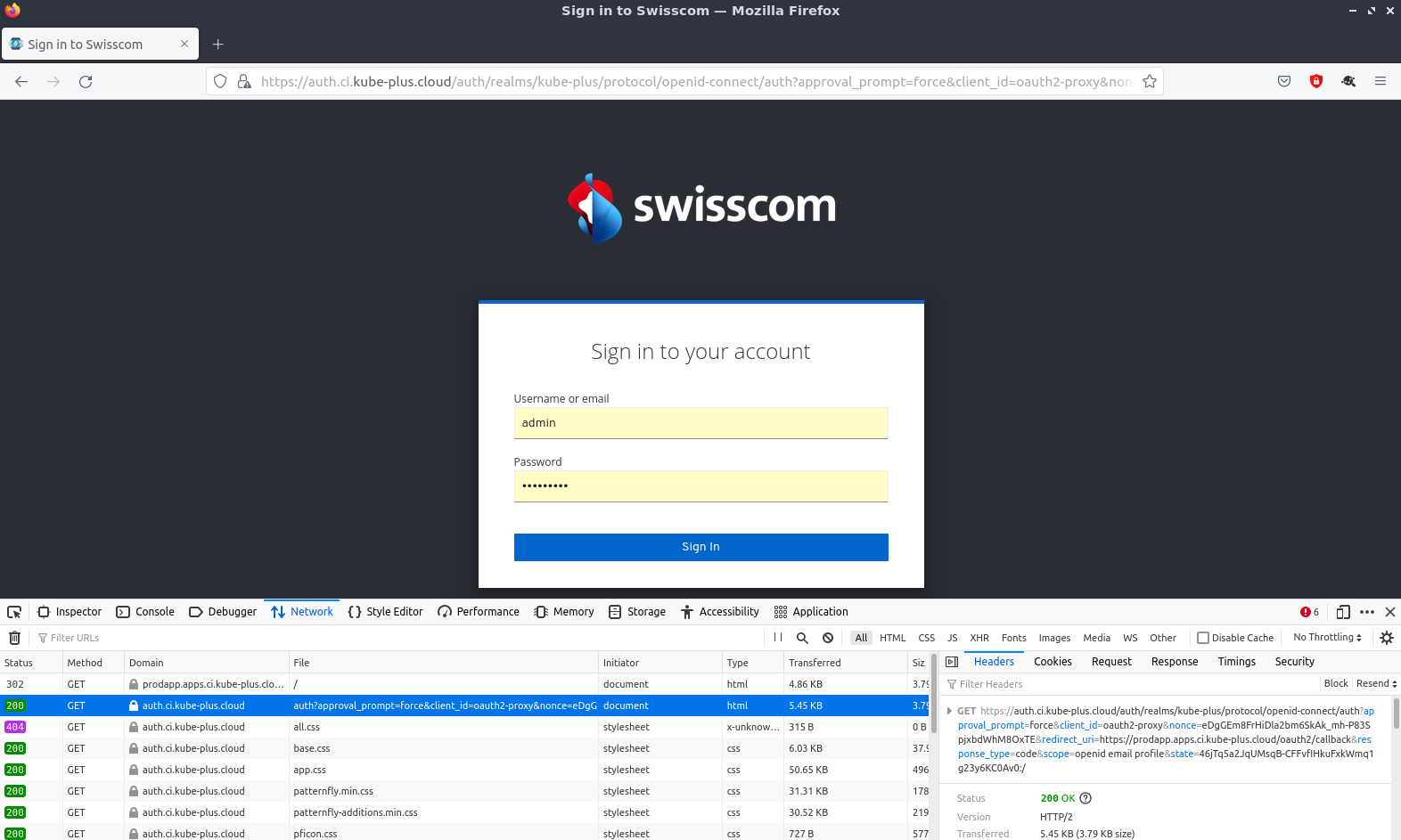
Since we did not specifically configure permissions on keycloak for the used client we can login with the existing keycloack user (admin or kube-plus).
After the login succeeded we are back on the default welcome page of nginx.
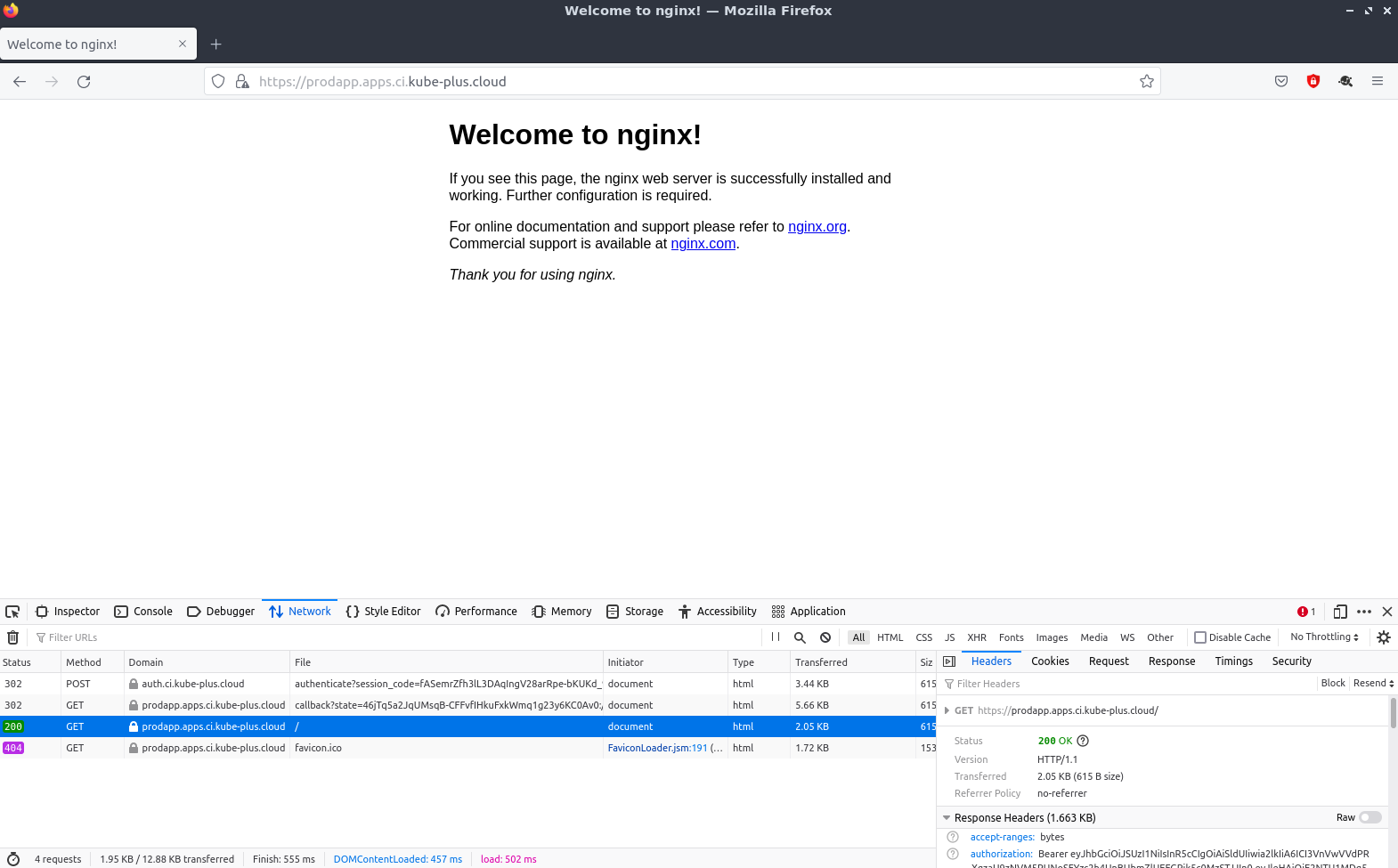
# Check SSO
We now copy the existing yaml file and replace the names within the file from prodapp to prodapp2.
We deploy the copied and adjusted manifest with kubectl.
At last we adjust the "oauth2-client" on keycloak to allow the new redirect URI 'https://prodapp2.ci.kube-plus.cloud/oauth2/callback' also.
We can access the other app (dedicated nginx/oauth2-proxy) without to login again. SSO Success.
In this case we used the same OAuth keycloak client "oauth2-proxy" for both apps.
For the SSO experience it would not have an impact on using another OAuth client with similar configurations.
